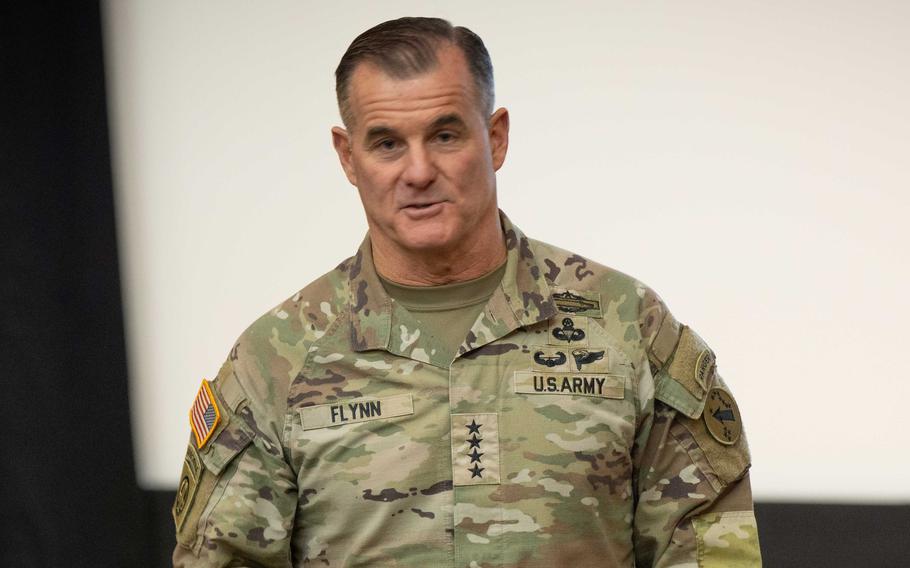
Gen. Charles Flynn, commander of the U.S. Army Pacific, speaks at the Naval War College in Newport, R.I., in 2023. (U.S. Army)
Chinese military expansion is pushing Asian nations into closer strategic partnership with the United States that has parallels to NATO in Europe, the top Army commander for the region said Wednesday.
“We can help them protect and defend their territorial integrity and national sovereignty,” Gen. Charles Flynn said during a teleconference with reporters.
Flynn, 60, is commander of the U.S. Army Pacific, which has 107,000 soldiers and civilian workers spread across 9,000 miles including Alaska, Japan, South Korea, Guam, American Samoa, and Saipan.
Chinese military and commercial operations throughout the Pacific region have other nations worried about counterbalancing Beijing’s influence and power, he said.
“The sense of the insidious, incremental and irresponsible behavior -- and that’s how I frame the way the Chinese are acting out there -- has created a groundswell on the work that we do,” Flynn said.
Chinese actions have created a more receptive attitude in many Asian and Pacific nations to work with the U.S. Army on shoring up their own forces and cooperating in mutual defense with neighboring states.
“They appreciate a stable and secure region,” Flynn said.
U.S. Army Pacific has its headquarters at Fort Shafter in Hawaii, where there will be a meeting of army commanders from 15 nations and representatives of more than 15 others next week at the LANPAC Symposium & Exposition. The event could help cement the military cooperation between the United States, its allies in the Pacific, and other nations.
Flynn said he has pointed out in previous forums that three of the largest land wars in the past 60 years -- World War II, the Korean War and the Vietnam War – have all happened in the U.S. Army Pacific’s area of operations.
Now the command is being asked to assist in ways to build resistance to Chinese dominance and increased Russian military presence in Asia, he said. The stability of the region is also challenged by the regime in North Korea.
From wargames in Thailand to improved infrastructure in the Philippines to training security forces in Mongolia, Flynn said Wednesday that the region allows the U.S. military to practice major logistical moves -- taking equipment and troops from the West Coast, Alaska and Hawaii to Southeast Asia, northern Japan and the Arctic Circle.
“This is just a massive piece of Earth,” he said.
It’s also a testing ground for weapons, which face sopping humidity and saltwater corrosion in Thailand during exercises there and sub-zero temperatures and wilderness conditions during multinational wargames in Alaska.
“We’re building new capabilities into the region, from intelligence capabilities to long-range precision fire to integrated air and missile defense,” Flynn said. “We can sustain that capability.”
He said year-round training exercises in different nations and environments teach practical lessons on what works, what needs improvement, and what needs to be changed.
“When we put that capability out there, really in a very granular way, from the maintainers to the commanders, to the noncommissioned officers and warrant officers, the effects of those conditions on the equipment” can be repeatedly challenged, Flynn said. “When we introduce our soldiers and their leaders and these capabilities into the environment and those conditions, there’s great insights and lessons from that.”
He said military cooperation between nations in the Pacific region will take time to integrate in a way comparable to the NATO. The ability to move troops, weapons, and supplies across vast distances, weather, and terrain is a work in progress.
“Does it mean we have everything we need?” Flynn asked. “No. But what it does mean is that the Army recognizes that the investments out here are incredibly important.”
Flynn pointed to American help in improving airfields in the Philippines and a plan to deploy more supplies across the region to sustain troops in a protracted conflict as signs of progress in weaving together a unified response, particularly to China.
“The sum total of our structures, I would say, impacts in a very positive way out here,” he said.